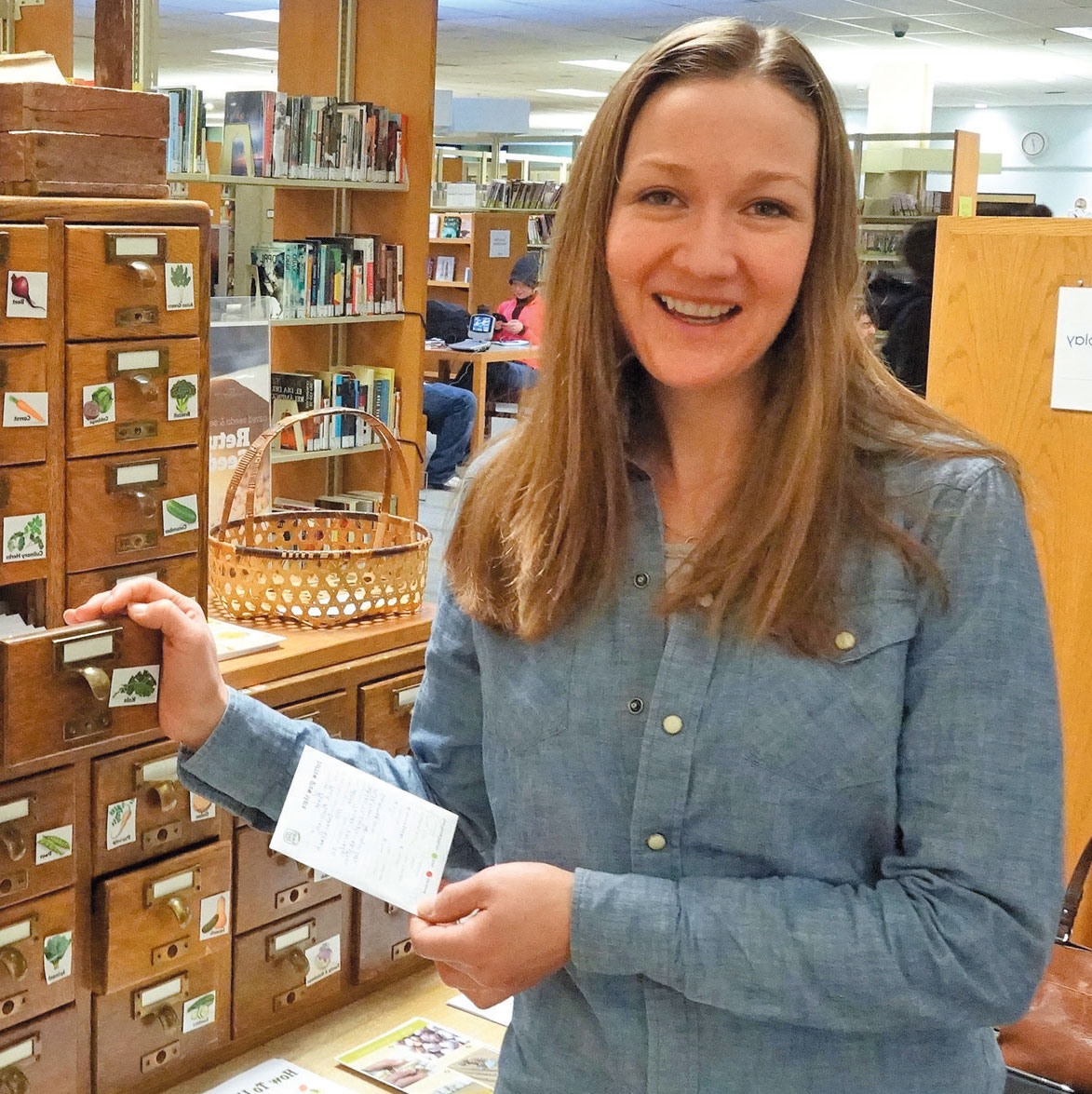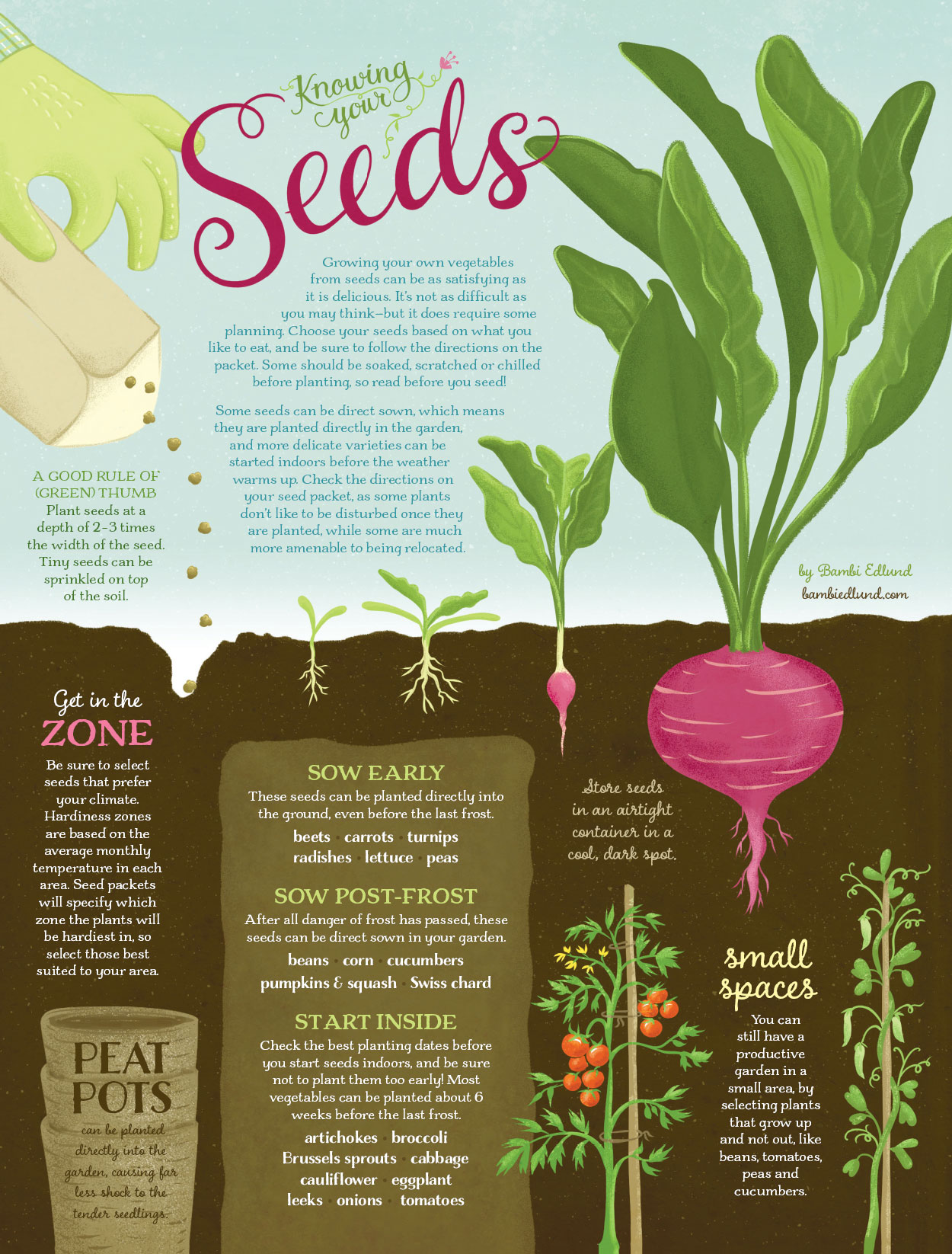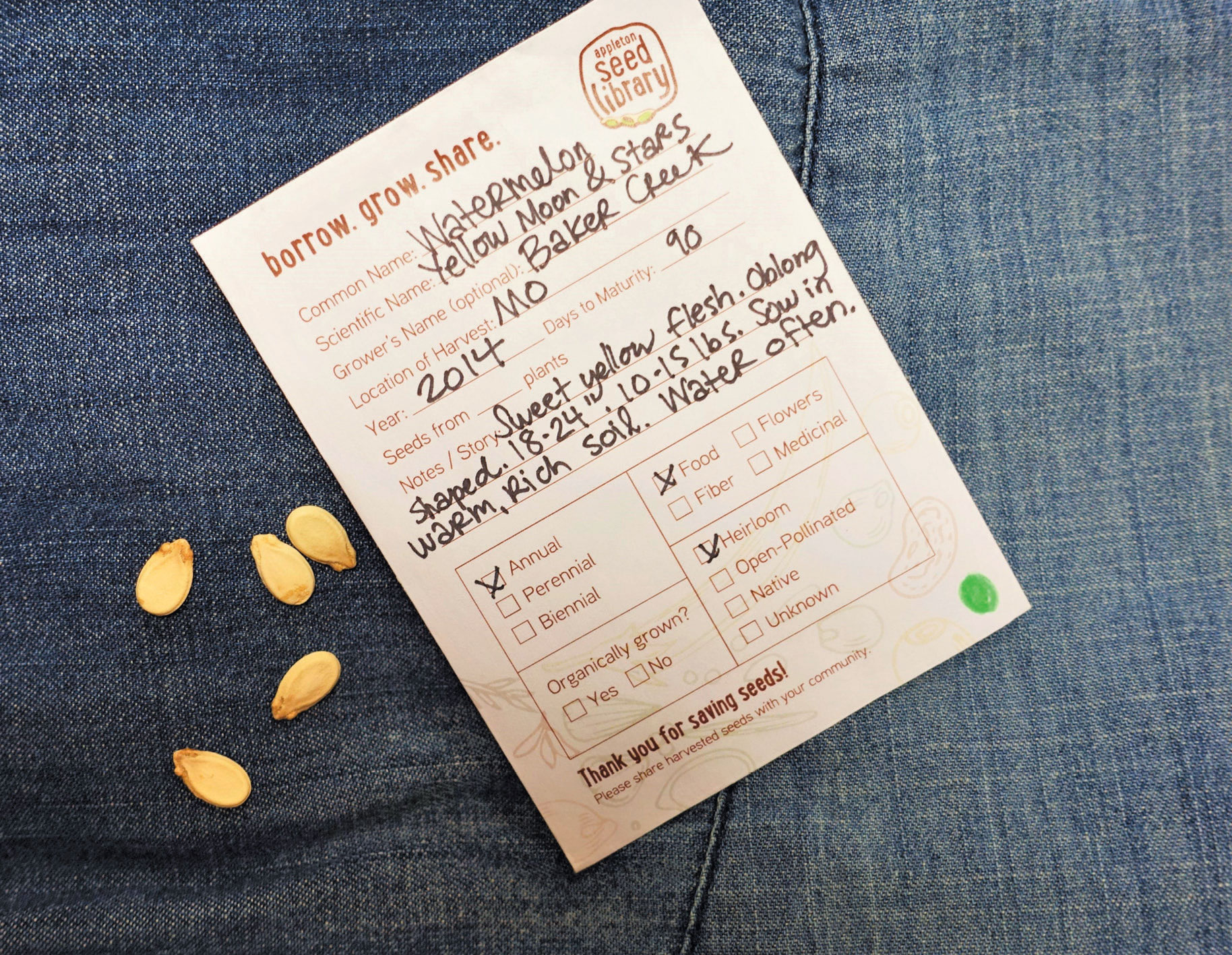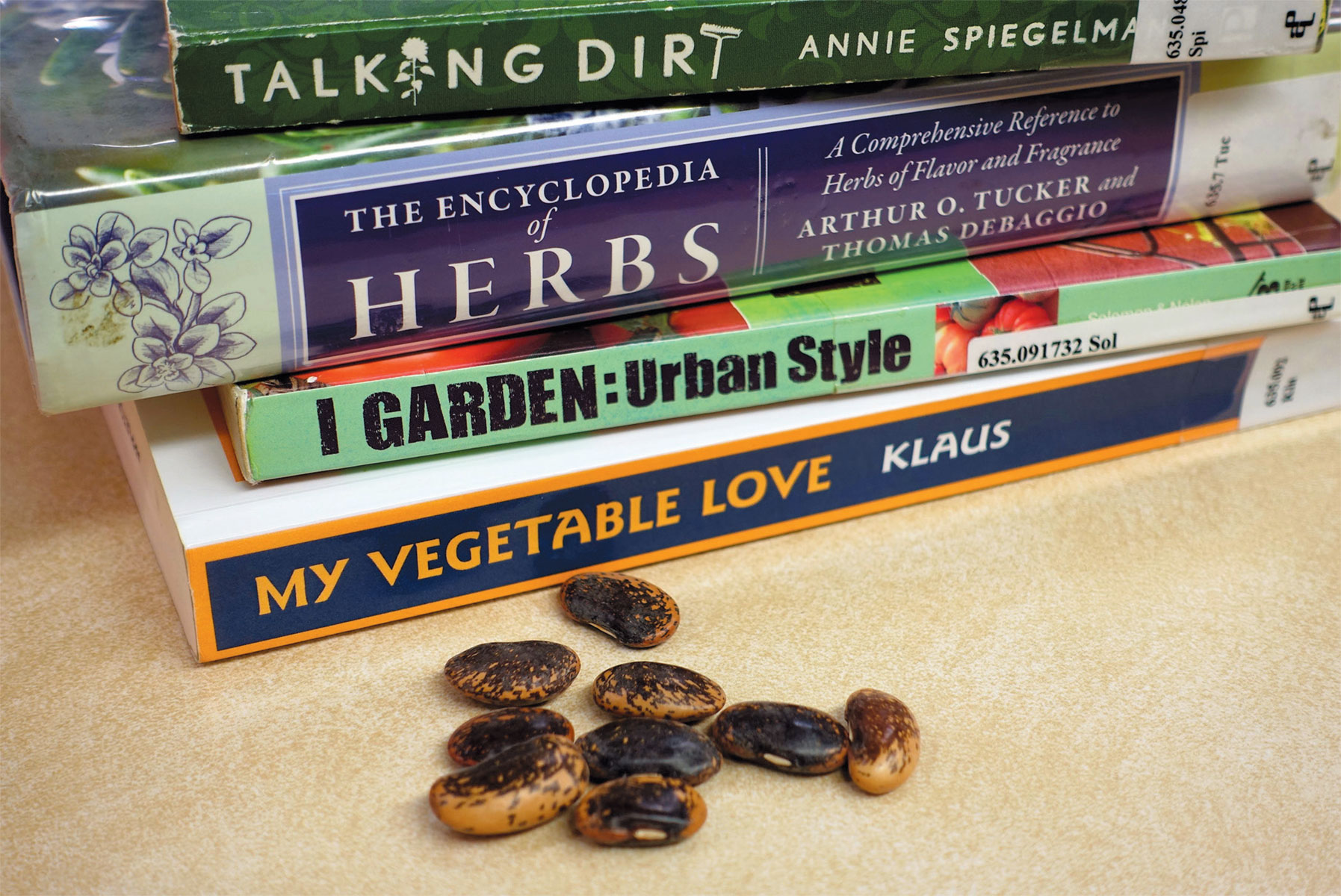Something New to Check Out
LIBRARY’S SEED COLLECTION OFFERS NEW RESOURCE FOR GARDENERS
Kari Witthuhn-Henning believes in the potential of a single seed.
As the creator of the Appleton Seed Library, she believes the Fox Valley community will discover that potential as well. The Appleton Seed Library is a community resource that lends heirloom and open-pollinated seeds to gardeners. Located within the downtown Appleton Public Library, the program allows participants to grow food and be educated on saving seeds, all while strengthening local seed diversity.
“Seed has a memory,” she explains. “The romance of an heirloom seed, versus a hybrid or a genetically modified one, is that an heirloom will adapt to the climate that it is grown in. So while we can't force okra to be a 50-day season crop, for example, something like tomato seeds can slowly adapt to the soil conditions in our area. They will adapt to our rainfall, and adapt to the pests we have here, growing stronger and more resilient each year.”
Witthuhn-Henning has also discovered there is a spiritual component in saving seeds. “When you follow a seed through its life cycle, there is something really transformative that happens within you. There's greater reverence for your food and where your food comes from ... from a tiny seed.” she says. Once a plant bears fruit or blossoms and then goes to seed, it has prepared itself to grow again many times over. "It fills your heart with joy to see how something so tiny can be so generous. That's the sappy side of it all.”
On the practical side, as an Outagamie County Master Gardner she says there is a common misconception about the length of time seeds are viable.
“You buy seed packets and they will be stamped 'packed for 2018',” she explained. “People think after that year they need to throw those seeds out because they didn't use them all.”
We don't give those seeds enough credit, she says, noting that as a general rule seeds have a minimum of three to six years of viability. Some have a much longer lifespan. That opens the door to creating local seed stocks better acclimated to Wisconsin climate. Saving more than seeds
With the partnership of the Appleton Public Library and the seed library, there was an opportunity to resurrect another type of nearly extinct heirloom in communities today: the classic wooden card catalog.
While researching ways to bring a local seed-sharing program to fruition, she contacted Elizabeth Eisen, adult programming librarian for the Appleton Public Library, and asked whether there were any old card catalogs that could serve as home for the collection of seed packets.
“When Elizabeth said there were some in storage, that was confirmation this project needed to go forward,” she said. “The card catalogs were just sitting down in the basement,” Eisen said. “It was a perfect addition and just fits right in with the decor. We were lucky that we still had some.” She relates that once in a while people will still come into the library looking for the iconic wooden card catalog to search for their books, even though those records have been on the computer for a decade.
Once housing card-after-card of books that could fill library-goers minds, the upcycled card catalog now has drawer-afterdrawer of seed packets that will fill librarygoers’ gardens.
The Appleton Seed Library launched in April, 2016 with 1,500 packets of seed thanks to donations from seed-saving organizations like Seed Savers Exchange of Iowa and Baker Creek of Missouri. Local business Stein Gardens & Homes also donated.
In that first year patrons checked out nearly 1,000 of those seed packets. While some gardeners have already brought back seeds to keep the collection going, the program is developing additional ways to keep the seeds stocked.
“This year I am establishing some partner growers or seed stewards,” says Witthuhn- Henning, who is enlisting the help of some local CSA farmers and backyard gardeners. She is looking for organic gardeners willing to join the effort and learn seed-saving techniques. “I know this state already has avid seed savers, but the challenge is connecting with them,” she acknowledges. Gardeners dedicated to seed saving and focused on the slow, steady work of their hands may not be out looking for seed libraries or spending time on social media.
She continues to look for those already dedicated to seed saving, not just for the seeds they may have to share, but also for their stories. Witthuhn-Henning said she wants to document and catalog Wisconsin seed stories because they tell their own tale of local history.
“There is a lovely woman in the community who donated seed from kale which had naturalized in her yard for eight years,” she said, citing one story. “It is this beautiful, Siberian- type kale – minty green and real ruffled. She learned the whole process of how to save the kale seed: when to harvest and how to dry in paper bags. She even threshed it, winnowed off the chaff and then donated an entire halfpint jar of seed for us.”
Gardeners wishing to use the self-service seed library do not need to be a member of the Appleton Public Library. The collection is available year-round and includes vegetable, flowers, native plants and herbs. Gardeners are encouraged to browse through drawers and find some seeds to borrow, then help themselves .
Participants are asked to fill out a membership form so the program can track its impact.
From there, gardeners go home, grow the seeds, and enjoy the produce. In keeping with the mission of the program, gardeners are asked to grow them out organically and forgo the use of pesticides.

Kari Witthuhn-Henning is creator of the Appleton Seed Library with repurposed card catalogs.
The green dot
Witthuhn-Henning says a good place for first-time seed savers to start is with the packets labeled with a green dot indicating they are good for beginners.
“Some really easy seeds to save are sunflowers, lettuces, legumes, peas, beans, tomatoes, peppers, egg plants and tomatillos,” she notes, adding the reason they are so easy to save is the way their flower is formed. “They have both male and female parts right in the same flower, so they self-pollinate. They are not reliant on insects or wind and stay more true to seed.”
The final aim of the seed-sharing program is giving back. “Challenge yourself to learn seed saving and just bring at least one type back,” she advises participants, noting that gardeners should not be hesitant if they end up with only a few seeds to donate back to the program. “When several people do that, it will make for a diverse collection.”
The seed library also accepts donations of seeds left over from purchased packets of heirloom and open-pollinated varieties when there is just more seed than gardeners will plant themselves. Using these overstock seeds was also part of the inspiration to launch this effort.
“Before starting the seed library, one of the struggles I had as a gardener is that you would spend all this money to order your seeds every year, and you used a fraction of them,” Witthuhn-Henning relates. “I had like this seed remorse. My seed babies weren't going anywhere and they were sitting there. I was becoming a seed hoarder at home. Packet after packet, year after year, you don't use them all.”
For its part, the Appleton Public Library has been providing ongoing adult programming that aligns with using the seed collection.
Last year they sponsored an heirloom tomato-tasting event and Master Gardener presentations on gardening tips and tricks. Eisen said the Wisconsin Library Association was able to provide guidance on how best to host a seed library program to encourage patronage, but stay within state laws regulating seed distribution. She notes there are a handful of other successful seed library programs across the state in Madison, Waupaca and La Crosse.
The seed library has also received support from the Outagamie County Master Gardeners and Friends of Appleton Public Library. They received an environmental sustainability grant through the Community Foundation for the Fox Valley.
Ultimately, the Appleton Seed Library was designed to be a social learning project for the community.
“Seeds are very fruitful. Silently I want people to discover that on their own,” Witthuhn-Henning says. “We won't be calling them. They won't get a fine on their card. That's not what it is about. It's about creating conversation and dialogue and making people more aware.” More information on the Appleton Seed Library is available at www.theseedguild.com or on their Facebook page at www.facebook.com/aslibrary.
Seedy Saturday
An open house will be held Saturday, April 14, at the Scheig Center within the Appleton Memorial Park, 1313 E. Witzke Blvd., Appleton, from 11 a.m. to 4 p.m. Ben Cohen, storyteller, seed saver and homesteader from Small House Farm in Michigan, will be the keynote speaker. The event includes heirloom seed swapping, hands-on seed saving demonstrations, displays by the Wild Ones organization, and more. The Heirloom Kitchen will be offering a locally-sourced menu with many heirloom flavors.
A COUPLE OF EXAMPLES
Here are a couple of unique seed varieties available at the Appleton Public Library Seed Library.
Sheboygan Tomato - Seed Savers Exchange notes this pink paste tomato with excellent flavor was given to them by a former University of Wisconsin Green Bay ecology professor and has been grown since the early 1900s by LIthuanian immigrants in the Sheboygan area. Great for canning.
Pride of Wisconsin Melon - This melon was grown Milwaukee markets in the 1920s. It had almost disappeared from trade at one point had the seed not been saved by a handful of gardeners. The melon is reported to have excellent flavor and sweet orange flesh.
Knowing your Seeds - Click Here for a Larger Version







